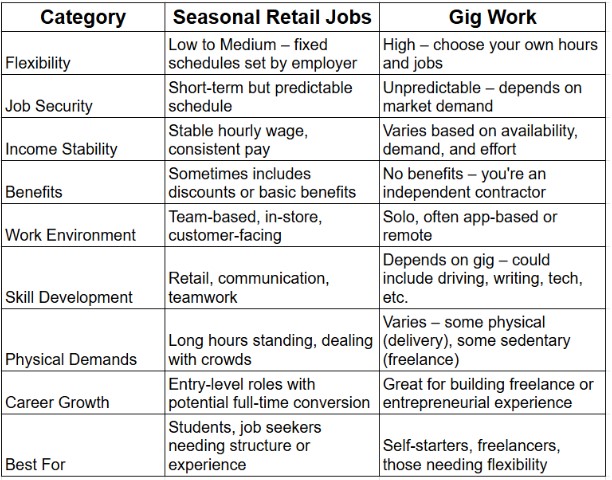 10 Business Days in the Workplace: What It Means for Deadlines and Projectsby admin / May 6, 2025
10 Business Days in the Workplace: What It Means for Deadlines and Projectsby admin / May 6, 2025Seasonal Retail Jobs vs. Gig Work: Which Is Better for You?
As the holiday season approaches or summer sales begin, many people start exploring short-term employment opportunities. Two common paths emerge: seasonal retail jobs and gig work. Both offer flexibility and the chance to earn quick income, but they cater to different needs, lifestyles, and career goals. So, which one is right for you?
In this post, we’ll break down the pros and cons of seasonal retail jobs and gig work to help you decide which suits you best.
What Are Seasonal Retail Jobs?
Seasonal retail jobs are temporary positions created to help stores manage increased foot traffic during peak seasons like the holidays, back-to-school periods, or summer. Roles often include:
- Cashier
- Sales associate
- Stock replenisher
- Customer service representative
These jobs typically last a few weeks to a few months.
Pros:
- Stable Schedule: Set shifts and hours offer predictability.
- Employee Perks: Discounts, holiday bonuses, and sometimes access to healthcare if hours are sufficient.
- Workplace Experience: Great for gaining retail or customer service experience.
- Team Environment: Ideal if you enjoy working with others and a structured environment.
Cons:
- Fixed Location: You must travel to the same place every shift.
- Limited Flexibility: Schedules are often determined by the employer.
- Short-Term Commitment: Once the season ends, so does your job.
- Physical Demands: Long hours standing or lifting can be taxing.
What Is Gig Work?
Gig work includes freelance or on-demand jobs—like driving for Uber, delivering food with DoorDash, doing odd jobs through TaskRabbit, or freelance writing via platforms like Upwork. You pick what, when, and how much you work.
Pros:
- Ultimate Flexibility: Choose your own hours and workload.
- Diverse Opportunities: Do what matches your skills—writing, driving, dog walking, and more.
- Multiple Income Streams: You can juggle several gigs at once.
- Work-from-Anywhere Options: Many gigs (especially digital ones) allow remote work.
Cons:
- Income Instability: Pay can vary greatly from week to week.
- No Benefits: Gig workers are independent contractors and usually get no health coverage, paid leave, or retirement contributions.
- Self-Employment Taxes: You’re responsible for filing your own taxes and managing expenses.
- Isolation: Some gigs are solo by nature, which might not appeal to everyone.
Which Is Better for You?
Let’s compare based on a few key factors:

Final Thoughts
If you’re someone who thrives in a team setting and prefers routine, a seasonal retail job may be the better fit. You’ll enjoy a more predictable income, some employee benefits, and the chance to build experience in a structured environment.
On the other hand, if you value freedom, independence, and flexibility, gig work could be your ideal path. It allows you to choose what kind of work you want to do and when—perfect for those who dislike rigid schedules or want to work from anywhere.
Ultimately, the “better” choice depends on your personal goals, financial needs, and lifestyle preferences. In some cases, people even do both—holding a seasonal job while picking up freelance gigs on the side.



